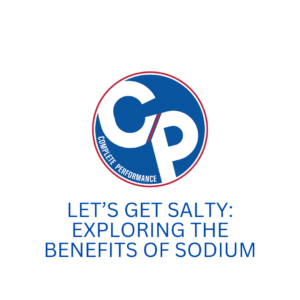Sodium, often synonymous with salt, has been a topic of much debate in the health and wellness world. While excessive sodium intake can indeed be harmful, moderate consumption of this essential mineral offers numerous benefits that are worth exploring. So, let’s dive into the salty details and uncover the surprising perks of sodium in our diet!
Sodium: The Essential Electrolyte
First and foremost, sodium plays a crucial role as an electrolyte in the body. It helps maintain proper fluid balance, supports nerve function, and aids in muscle contractions. Without an adequate level of sodium, our cells wouldn’t be able to communicate effectively, leading to disruptions in various bodily functions.
Blood Pressure Regulation
Contrary to popular belief, sodium is not the sole culprit behind high blood pressure. In fact, a balanced intake of sodium, along with other nutrients like potassium, calcium, and magnesium, is essential for regulating blood pressure. Sodium helps to expand blood volume, ensuring that our circulatory system functions optimally.
Enhanced Hydration
Sodium plays a key role in hydration by helping the body retain water. This is especially important during physical activity or in hot weather when we lose fluids through sweat. Including a moderate amount of sodium in our diet can aid in maintaining proper hydration levels and preventing dehydration.
Improved Athletic/Training Performance
Athletes and active individuals can benefit from sodium’s ability to maintain electrolyte balance. During intense exercise, especially in endurance sports, sodium loss through sweat can lead to electrolyte imbalances and cramping. Consuming electrolyte-rich fluids or foods with sodium can help sustain energy levels and enhance performance.
Cognitive Function
Believe it or not, sodium also plays a role in cognitive function. It is involved in nerve signaling, which is essential for brain function and communication. Adequate sodium intake supports mental clarity, focus, and overall cognitive performance.
Mood Regulation
Sodium is linked to the regulation of neurotransmitters like serotonin and dopamine, which are known for their role in mood and emotions. Maintaining a healthy balance of sodium can contribute to stable mood levels and overall emotional well-being.
Sources of Healthy Sodium
While processed and packaged foods are often high in sodium and should be consumed in moderation, there are plenty of natural and healthy sources of sodium. These include:
– Seafood: Fish like salmon and shrimp are not only rich in protein but also provide beneficial amounts of sodium.
– Vegetables: Certain vegetables like spinach, kale, and celery contain sodium naturally.
– Dairy: Milk and yogurt are good sources of sodium, along with essential nutrients like calcium.
– Nuts and Seeds: Almonds, peanuts, and sunflower seeds offer a nutritious blend of sodium and healthy fats.
– Herbs and Spices: Using herbs and spices like basil, thyme, and turmeric can add flavor and a touch of sodium to dishes without excess salt.
Moderation is Key
While sodium offers a range of benefits, it’s crucial to consume it in moderation. The recommended daily intake of sodium for most adults is around 2,300 milligrams, equivalent to about one teaspoon of salt. Excessive sodium intake, especially from processed foods, can contribute to health issues like high blood pressure and cardiovascular disease.
But what if you’ve been told to watch your sodium intake?
For individuals who need to monitor their sodium intake, whether due to health concerns or specific dietary goals, here are some practical tips to achieve a balanced approach:
Read Labels Carefully
When shopping for packaged foods, pay close attention to nutrition labels. Look for products labeled “low sodium,” “reduced sodium,” or “no added salt.” Compare sodium content among similar items and choose the lower sodium options whenever possible.
Choose Fresh and Whole Foods
Opt for fresh fruits, vegetables, lean proteins, and whole grains. These foods are naturally lower in sodium compared to processed or pre-packaged foods. Incorporate a variety of colorful produce to enhance flavor without relying heavily on salt.
Limit Processed Foods
Minimize consumption of processed foods such as canned soups, frozen meals, deli meats, and snack items like chips and pretzels. These often contain high amounts of sodium for flavor and preservation. Consider homemade alternatives or choose low-sodium versions of these foods.
Be Mindful When Dining Out
When dining at restaurants, ask for dishes to be prepared without added salt or with reduced salt. Request sauces, dressings, and condiments on the side so you can control the amount you use. Choose grilled, steamed, or baked options over fried or heavily seasoned foods.
Monitor Portions
Even lower sodium foods can contribute to high intake if consumed in large quantities. Pay attention to portion sizes and practice mindful eating. Use smaller plates to help manage portion control and avoid overeating.
Stay Hydrated
Proper hydration is important for maintaining electrolyte balance. Drink plenty of water throughout the day, especially if you’re physically active or in a hot environment. Avoid sugary beverages and opt for water or unsweetened drinks.
Consult with a Healthcare Professional
If you have specific health concerns related to sodium intake, such as high blood pressure or kidney issues, consult with a healthcare professional or registered dietitian. They can provide personalized guidance and help you create a meal plan that meets your nutritional needs while managing sodium intake.
How to Add Flavor WITHOUT Sodium
Now, whether you’re monitoring your sodium intake or not, it is important to know that there are alternative ways to add pizazz and flavor to your foods.
Here are seven tips on how to add flavor to dishes without relying on sodium:
1. Use Fresh Herbs: Incorporate a variety of fresh herbs like basil, cilantro, parsley, rosemary, and thyme into your cooking. Herbs not only add vibrant flavors but also contribute nutrients and antioxidants to your meals.
2. Experiment with Spices: Explore a range of spices such as cumin, paprika, turmeric, coriander, cinnamon, and ginger to enhance the taste of your dishes. Spice blends like curry powder, Italian seasoning, and garam masala can add complexity without extra salt.
3. Citrus Zest and Juice: Grate the zest of citrus fruits like lemons, limes, and oranges to add a burst of flavor to marinades, dressings, sauces, and seafood dishes. Freshly squeezed citrus juice can also brighten up salads, meats, and vegetables.
4. Garlic and Onions: Use minced or crushed garlic and onions to add depth and savory notes to soups, stews, stir-fries, and sauces. Roasting or caramelizing garlic and onions can intensify their flavors.
5. Vinegars: Experiment with different types of vinegars such as balsamic vinegar, apple cider vinegar, red wine vinegar, and rice vinegar. Vinegars add tanginess and acidity to dishes, balancing flavors without added sodium.
6. Healthy Oils: Use high-quality oils like olive oil, avocado oil, sesame oil, and coconut oil to sauté vegetables, drizzle over salads, or add richness to roasted dishes. Infuse oils with herbs and spices for added flavor.
7. Umami Ingredients: Incorporate umami-rich ingredients like mushrooms, tomatoes, soy sauce (choose low-sodium options), miso paste, nutritional yeast, and Parmesan cheese to enhance the savory profile of your dishes without relying on salt.
By incorporating these flavorful alternatives into your cooking, you can create delicious and satisfying meals while reducing your reliance on sodium for taste. Experiment with different combinations and discover new culinary delights!
Look, sodium is not the villain it’s often made out to be. When included as part of a balanced diet, it provides essential benefits for overall health, hydration, athletic performance, and cognitive function. By choosing natural sources of sodium and being mindful of our intake, we can enjoy the savory goodness of this vital mineral without compromising our well-being.




